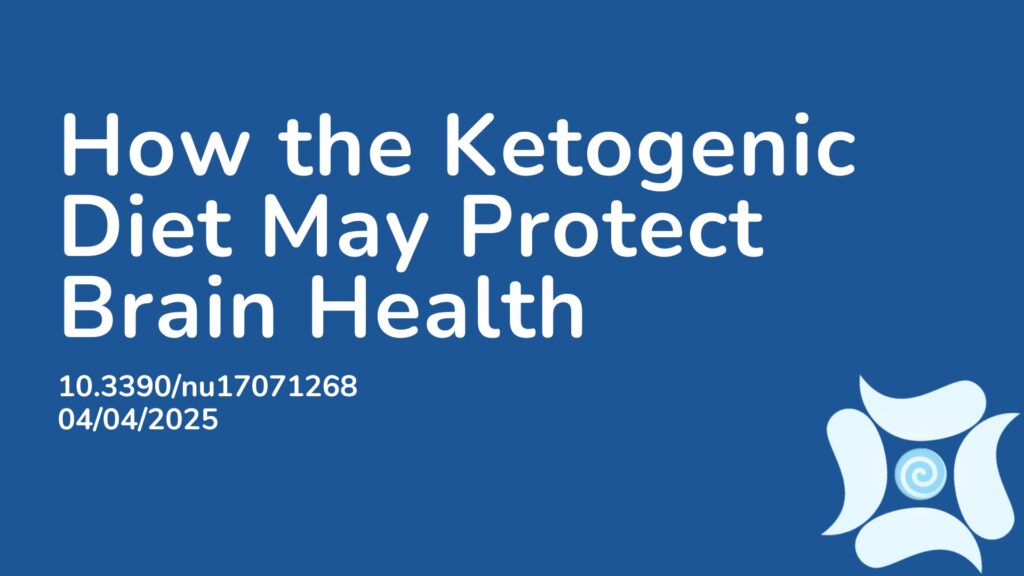Summary:
Neurological disorders, particularly neurodegenerative diseases, are a leading cause of death and disability worldwide. This burden is expected to grow, with emerging evidence that infections such as SARS-CoV-2 may accelerate neurodegenerative processes through inflammation and immune disruption. These findings highlight the importance of developing new approaches to protect brain health. One area of growing interest is nutrition, with the ketogenic diet being one of the most studied interventions. This diet is high in fat and low in carbohydrates, inducing ketosis and the production of ketone bodies. These molecules enhance mitochondrial function, reduce oxidative stress, and regulate inflammatory pathways, mechanisms directly involved in neurodegeneration. This review examined existing studies on the therapeutic effects of the ketogenic diet in neurological conditions. The evidence suggests consistent neuroprotective effects, including improvements in energy metabolism and reductions in oxidative damage. Clinical studies reported improvements in cognitive function among Alzheimer’s patients and reduced motor symptoms in Parkinson’s disease. Findings in Huntington’s disease and other disorders also point to potential benefits. Overall, the ketogenic diet showed promise as a complementary therapeutic strategy for neurodegenerative diseases by targeting underlying metabolic and inflammatory processes. However, current evidence is drawn from small clinical trials and preclinical models, so there is a great need for larger, longer-term studies to confirm efficacy and establish safety for clinical use.
Abstract:
The ketogenic diet (KD) is a dietary intervention comprising a high-fat, low-carbohydrate, and moderate-protein intake designed to induce a metabolic state known as ketosis, whereby ketone bodies are produced as an alternative source of energy. Initially established as a treatment for intractable epilepsy, the KD has subsequently gained significant attention for its potential to manage neurodegenerative diseases, including Alzheimer’s, Parkinson’s, and Huntington’s disease. Ketone bodies, such as beta-hydroxybutyrate (BHB), have been demonstrated to possess neuroprotective properties. The increasing prevalence of neurodegenerative diseases, such as Alzheimer’s, Parkinson’s, and Huntington’s disease, poses a significant public health challenge worldwide. With neurological disorders being the second-leading cause of death globally, the need for effective therapeutic interventions has never been more urgent. Recent evidence suggests that dietary interventions, particularly the ketogenic diet, offer promising potential in mitigating the progression of these diseases by influencing metabolic processes and providing neuroprotective benefits. The ketogenic diet, characterized by high-fat and low-carbohydrate intake, induces ketosis, leading to the production of ketone bodies like beta-hydroxybutyrate, which enhance mitochondrial efficiency, reduce oxidative stress, and modulate inflammatory pathways—mechanisms critical in neurodegenerative pathophysiology. This review explores the role of the ketogenic diet in managing neurological conditions, examining its mechanisms of action, historical context, and therapeutic efficacy. The paper also discusses emerging evidence linking the ketogenic diet to improved cognitive function, reduced motor symptoms, and enhanced mitochondrial activity in patients with neurodegenerative disorders. Additionally, the review highlights the need for further research to refine the therapeutic applications of the ketogenic diet, investigate its impact on various neurodegenerative diseases, and better understand its potential long-term effects. This study underscores the importance of nutrition as a vital aspect of the treatment strategy for neurological diseases, advocating for continued exploration of dietary interventions to improve brain health and function.
Article Publication Date: 04/04/2025
DOI: 10.3390/nu17071268



